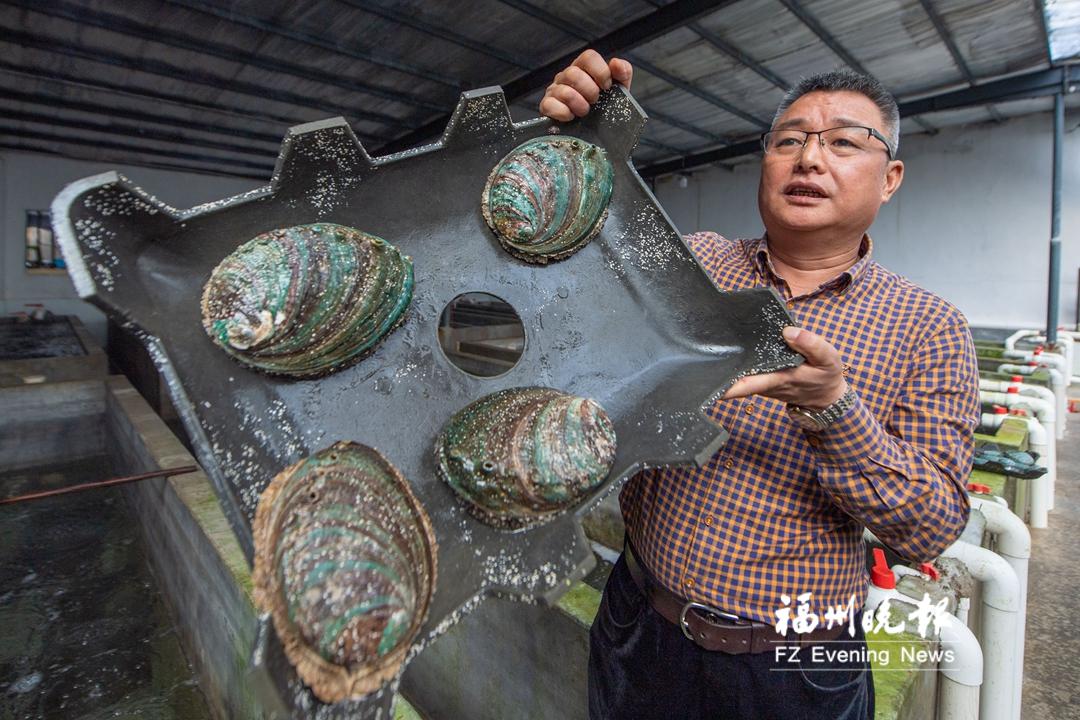Fuzhou’s “Giant” Abalone Passes Provincial-Level Acceptance
Seedlings are the “chips” of the aquaculture industry. The reporter recently learned that the “Giant” abalone species, “Fubao No.1,” has passed the provincial-level acceptance for large-scale breeding technology and promotion demonstration. This marks the beginning of the large-scale promotion of Fuzhou’s high-quality “abalone chips.”

The “Fubao No.1” Variety, Known As the “Giant” Abalone (File Photo, by Reporter Lin Shuangwei)
According to information, the Fujian Provincial Department of Science and Technology organized experts from Fujian Normal University, the Fujian Freshwater Fisheries Research Institute, and the Fujian Ocean Vocational and Technical College to evaluate the “Fubao No.1” Large-Scale Breeding Technology and Promotion Demonstration project. This project, as part of the Fujian Provincial Science and Technology Program, was carried out by the Fuzhou Marine and Fisheries Technology Center in collaboration with Guanwu Marine Products Development Co., Ltd. in Lianjiang County.
After reviewing the documents, conducting inquiries, engaging in discussions, and listening to the reports, the expert panel confirmed that the project met the standards for large-scale breeding technology and promotion demonstration, and unanimously agreed to accept it.
Since 2021, the Fuzhou Marine and Fisheries Technology Center has partnered with Guanwu Marine Products Development Co., Ltd. in Lianjiang County to introduce and preserve foreign Haliotis fulgens and haliotis discus hannai from North China. They have also been using the Haliotis fulgens as the male parent and the Haliotis discus hannai as the female parent to carry out interspecies hybridization, focusing on the large-scale breeding and production of the “Fubao No.1” hybrid seedlings.
After three years of work, the project has successfully developed high-quality parent strains of Haliotis discus hannai (female) and Haliotis fulgens (male). They have overcome key challenges in parent acclimatization, significantly improving fertilization and hatching rates for seedling cultivation. So far, over 6 million “Fubao No.1” hybrid seedlings have been bred, with a demonstration area covering 36 mu and a value increase of more than 6 million yuan.
According to Lin Zhelong, the head of Guanwu Marine Products Development Co., Ltd. in Lianjiang County, “Fubao No.1” is like the “giant” of the abalone world. It’s bigger than an adult’s palm and can weigh up to 1 kilogram. It features high-temperature tolerance, rapid growth, and strong resistance to adverse conditions. This has broken the long-standing dominance of foreign wild abalones in China’s market for large-sized premium abalones and high-end dried abalones.
It is worth mentioning that the company has also introduced four wild abalone species: Haliotis fulgens, Haliotis rufescens, Haliotis Corrugata, and Haliotis discus hannai, aiming to cultivate more high-quality varieties suited to local aquaculture.
Fuzhou is stepping up its push to drive innovation in aquatic seedling breeding. The city is deepening partnerships with leading universities, including Xiamen University, Jimei University, and Minjiang University, as well as key research institutes like the Chinese Academy of Fishery Sciences and the Fujian Provincial Center for Marine and Fisheries Seed Research. Together, they’re working to build a strong and distinctive Fuzhou brand in the aquatic seedling industry. (Fuzhou Evening News Reporter: Zheng Ruiyang; Correspondent: Li Ningwei)